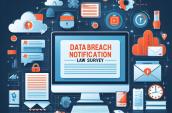Privacy has been a hot topic in 2013, and the New Year presents a perfect opportunity to examine how we protect our personal information and resolve to do better. Privacy Rights Clearinghouse poses ten questions to help you manage your privacy in the coming year.
Do you know your apps? Every time you allow a third-party application to access your device, you risk exposing your personal information. Reputable apps will have a privacy policy available for you to read. The policy should explain what data is being collected about you and how it will be stored, used and shared. Make sure you agree with it before you install the app. Even a seemingly harmless app can collect much more information than you might guess. Recently, a popular flashlight app was found to have provided location information and device ID numbers to advertising networks and other third parties. Learn more by reading PRC Fact Sheet 2b: Privacy in the Age of the Smartphone and PRC Fact Sheet 39 Mobile Health and Fitness Apps: What Are the Privacy Risks?
Are you following good password practices ? Never use the same password for multiple accounts. Instead, use strong passwords (with a combination of lower and upper case letters, numbers, and special characters) that are unique to each account. This is particularly important for your most sensitive online accounts (for example, your banking, email, and social networking accounts). Use a reputable password manager to track numerous passwords. Also, when you have the option, consider using two (or multi)-factor authentication.
Remember that password reset features may offer an easy opportunity to compromise your password. Be cautious when you choose any security questions and answers that will be used to authenticate you if you forget your password. Many times, answers to these questions (such as a pet’s name or where you went to high school) can be ascertained by others through social networking or other simple research tools. Learn more by reading 10 Rules for Creating a Hacker-Resistant Password.
Do you practice safe social networking? Many of us provide large amounts of personal information, including birth dates, photos, phone numbers, and more to Facebook and other social networking sites. Not only is this information a gold mine for marketers, identity thieves and other unscrupulous individuals, but it may also be used against you by current and future employers. Take control of your privacy settings. Choose “Friends Only” for all of your settings, unless you are sure it is information you wouldn’t mind being public. Learn more by reading PRC Fact Sheet 35: Social Networking Privacy: How to be Safe, Secure and Social.
Have you checked your credit reports recently? You are entitled to one free credit report per year from each of the three credit bureaus: Equifax, Experian, and TransUnion. If you order one report every four months, you can monitor your credit reports on an ongoing basis and help catch identity theft and errors. Learn more by reading PRC Fact Sheet 6: How Private Is My Credit Report?
Have you checked your consumer specialty reports? You have the right to free copies of numerous specialty consumer reports which report on such matters as your medical conditions, insurance claims, check-writing history, rental history, and employment history. Knowing what’s on them can be useful before applying for a new job, insurance, an apartment rental, or a bank account. Learn more by reading PRC Fact Sheet 6b: "Other" Consumer Reports: What You Should Know about "Specialty" Reports.
Do you safeguard your Social Security number (SSN)? Keep your Social Security card and other documents that contain your SSN in a safe and secure location. Push back when companies ask for your SSN. Ask them to explain their authority for requiring it, and what the consequences are if you do not provide it. Check your Social Security Earnings Statement for any signs of fraud. Look for earnings that exceed the amount you earned. It could be a sign that someone is using your SSN for employment. Learn more by reading PRC Fact Sheet 10: My Social Security Number - How Secure Is It?
Have you exercised your opt out rights? Sign up for the National Do-Not-Call List to limit unwanted telemarketing solicitations at (888) 382-1222 (888) 382-1222 or online at www.donotcall.gov. Stop pre-approved credit and insurance offers at (888) 567-8688
(888) 382-1222 or online at www.donotcall.gov. Stop pre-approved credit and insurance offers at (888) 567-8688 (888) 567-8688 or online at www.optoutprescreen.com. Remove yourself from many national mailing lists by registering for the Direct Marketing Association's Mail Preference Service at https://www.dmachoice.org/register.php. Learn more by reading PRC Fact Sheet 1: Privacy Survival Guide: Take Control of Your Personal Information.
(888) 567-8688 or online at www.optoutprescreen.com. Remove yourself from many national mailing lists by registering for the Direct Marketing Association's Mail Preference Service at https://www.dmachoice.org/register.php. Learn more by reading PRC Fact Sheet 1: Privacy Survival Guide: Take Control of Your Personal Information.
Do you still use a debit card? It’s best to avoid using debit or check cards. Credit cards provide better consumer protections, and help to protect your bank account from fraudulent activity. A compromised debit card can result in a loss of funds from your checking account for two weeks or longer. Learn more by reading PRC Fact Sheet 32: Paper or Plastic: What Have You Got to Lose?
Are you being assertive in guarding your privacy? When you are asked to provide sensitive information that you do not feel is necessary, ask whether providing the information is required or voluntary, how the information will be used, who will have access to the information, and how it will be protected from unauthorized access. Learn more about your privacy rights by consulting our many fact sheets at https://www.privacyrights.org/Privacy-Rights-Fact-Sheets
By asking yourself these questions and taking action now, you will be well on your way to protecting your privacy in the year ahead. And if you have a question or complaint, visit our Online Complaint Center to contact us.


